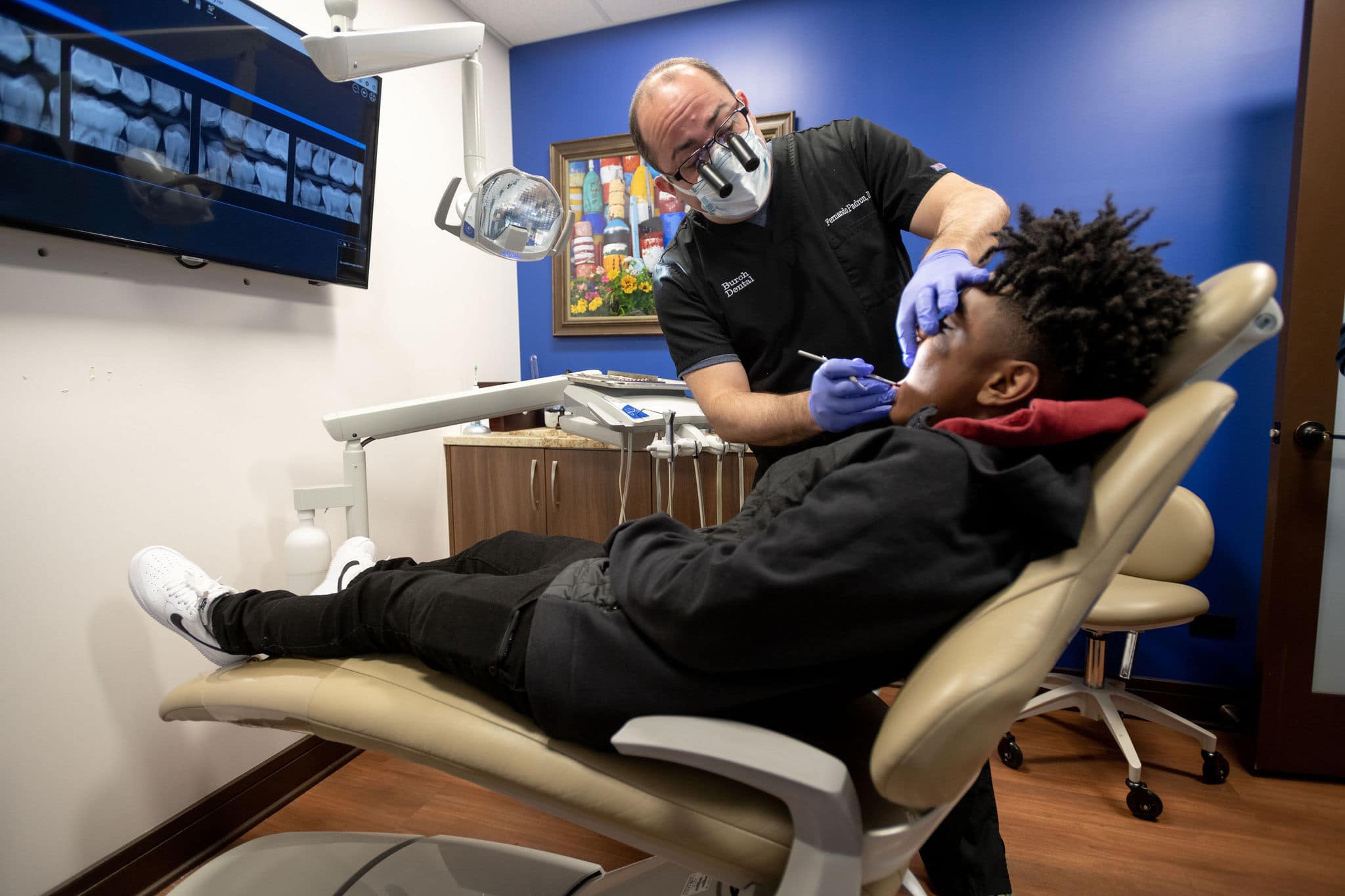TMJ, TMD and Bruxism
Rockford & Loves Park, IL
TMJ, TMD and Bruxism
Rockford & Loves Park, IL
TMJ and Bruxism problems are usually diagnosed through a detailed examination by Burch Dental. We will look for any evidence of TMJ-TMD and Bruxism on your teeth, mouth, gums, and tongue.
TMJ stands for temporomandibular joint, which is your jaw joint. TMJ syndrome or TMD (temporomandibular disorder) is a medical problem related to the function of that jaw joint. This usually presents itself as a popping, clicking, or crackling in the jaw joint and can be accompanied by an assortment of aliments, such as jaw joint or muscle pain, a jaw that locks in position or is difficult to open, headaches, ringing in the ears, and sometimes even numbness in the face and fingertips. Bruxism is a condition when you grind and clench your teeth, usually done at night. If you suspect you have either of these disorders, refrain from diagnosing it yourself. Make an appointment at Burch Dental to receive an accurate diagnosis before proceeding with proper treatment. These two conditions can present similar symptoms, making it easy to mistake one for the other.
The team at Burch Dental has a simple goal. That is to ensure your trust through our commitment to quality treatment and your continued satisfaction. It is our daily agenda to maintain a caring environment that is respectful and comfortable for everyone. Our team members are united in our efforts to promote oral health by means of prevention, enhancement, wellness, and rejuvenation. Call or visit one of our convenient locations today to schedule your appointment for an evaluation to determine if you might benefit from treatment for TMJ, TMD and Bruxism.
The Symptoms and Causes of TMJ-TMD
TMJ-TMD is a malfunction of the temporomandibular joint, which connects your jaw to your skull. Every time you open or close your mouth, you are using your temporomandibular joint. Since this is such a frequently used joint, severe TMJ-TMD can impact your quality of living. A dysfunction in this joint can have many possible causes:
- Abnormal bite or teeth alignment
- Excessive stress on the jaw muscles, which can be the result of bruxism
- A direct injury to the joint
- Arthritis
- Genetics
- Tumor
These are some of the suspected causes, and it is often hard to determine the exact cause of TMJ-TMD. If you develop a dysfunction in your temporomandibular joint, you may experience some of the following symptoms:
- Popping sounds when you open or close your jaw
- Headaches
- Jaw clenching
- Sore jaw and painful jaw
- Earaches or ringing in your ears
- Pain while chewing
- Locking of your jaw or difficulty opening and closing your jaw
- A pain that radiates from the joint to your temples, face, neck, or shoulders
The Symptoms and Causes of Bruxism
Bruxism is the teeth grinding or the clenching of your teeth, most often at night, but you may clench and grind your teeth during the daytime as well. Daytime bruxism is called awake bruxism and nighttime bruxism is called sleep bruxism.
As with TMJ-TMD, it is often difficult to determine the cause of bruxism. Some of the common suspected causes include:
- Stress and anxiety
- Misalignment of your jaw
- Sleep apnea
- Certain medications
- Excessive drug, alcohol, and tobacco use
Regardless of the cause of your bruxism, you may experience one or more of the following symptoms:
- Tooth sensitivity and toothaches
- Headaches
- Jaw soreness
- Broken, chipped, or cracked teeth
- Worn or flattened teeth
- Jaw or face pain
- Earaches
- Disrupted sleep (your partner might also experience disrupted sleep if your grinding is loud)
TMJ-TMD Treatments
After we have evaluated you and determined the severity of your TMJ-TMD, we will recommend treatment that will work best for you. Some suggested treatments may include:
- Using a night guard
- Relaxation techniques
- Jaw exercises and stretches to relieve pain
- Physical therapy
- Over-the-counter pain relief medications
- Cold or hot therapy
- Avoiding extreme and repetitive jaw movements, like yawning or chewing gum
- Surgery for extreme or stubborn cases
For most cases, the TMJ-TMD problem can be treated with a specially designed, plastic guard that is worn over the teeth at night. The guard must be customized to your situation. One size fits all guards, like those available in drugstores, may not solve the problem and can even make it worse.
If you infrequently experience jaw joint problems, then self-care practices may be enough to control your problem. This might include stress management like yoga or meditation, gentle stretching and massaging of the jaw joint muscles, the application of heat or ice packs, avoiding chewing gum, and not opening your mouth excessively wide.
Botox is another highly effective treatment for TMJ-TMD pain. Burch Dental can inject Botox into your overly tight, painful facial muscles to relax these areas, minimizing the TMJ-TMD discomfort. Botox also decreases nighttime clenching forces and decreases daytime TMJ-TMD pain. The Botox treatment lasts 3-4 months and is repeated, as necessary.
Bruxism Treatments
Wearing a night guard is the most common treatment for bruxism, but it certainly is not your only option. Treatments for bruxism are aimed at reducing symptoms or eliminating your bruxism altogether. Treatment options include:
- Stress management and relaxation techniques
- Muscle relaxants
- Botox for bruxism to weaken the muscles responsible
- Practicing consciously properly aligning your jaw
- Icing your jaw
- Braces to properly align your teeth
Our team most likely will recommend a bruxism guard. This is a different type of mouthguard than the kind used for TMJ-TMD. A bruxism mouth guard is worn on either your upper or lower teeth, and it can be made of a hard-plastic material or a softer, more pliable material. We may recommend a certain type of dental night guard that will work best for you and your bruxism. If you get a custom fitted night guard at Burch Dental, you will see your symptoms of bruxism reduce.






